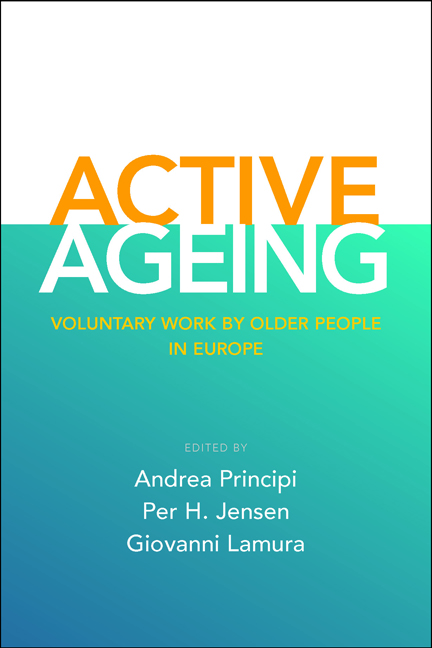Book contents
- Frontmatter
- Contents
- List of tables and figures
- Notes on the contributors
- Acknowledgements
- Foreword
- Part I Realising volunteering by older people in Europe An overarching approach
- Part II Opportunities and restrictions for older volunteers National experiences
- Part III Opportunities and restrictions for older volunteers Case studies in European voluntary organisations
- Part IV Conclusions
- Index
four - Older volunteers in Denmark: a large voluntary sector in a highly developed welfare state
Published online by Cambridge University Press: 05 March 2022
- Frontmatter
- Contents
- List of tables and figures
- Notes on the contributors
- Acknowledgements
- Foreword
- Part I Realising volunteering by older people in Europe An overarching approach
- Part II Opportunities and restrictions for older volunteers National experiences
- Part III Opportunities and restrictions for older volunteers Case studies in European voluntary organisations
- Part IV Conclusions
- Index
Summary
Introduction
It has sometimes been alleged that a voluminous welfare state as well as a heavy workload from formal employment reduces people's propensity to carry out voluntary work (Rostow, 1960; Wolfe, 1989; Fukuyama, 1995). One should therefore expect the level of voluntary work to be rather low in Denmark, in part because Denmark has a highly developed institutional welfare state, and because Danish labour force participation rates are rather high, reaching, in 2007, 81.8 per cent for men and 76.2 per cent for women. Furthermore, most women in employment work full time, which has been made possible by the provision of extensive and universal social services (child and elder care), financed by individual and progressive taxation. The Danish family model may thus be characterised as a dual breadwinner/external care model (Pfau-Effinger, 2004).
The welfare state–labour market–family–voluntary work nexus, however, is rather complex. In accordance with the findings of Williams and Windebank (1998, p 31), the Danish experience demonstrates that welfare state growth, increasing labour force participation rates and growth in civil society organisations can take place simultaneously. In 2007 the total number of voluntary organisations in Denmark was about 100,000. Out of a total population of 5.5 million, 38 per cent was engaged in voluntary work, and the economic value of voluntary work amounted to 9.6 per cent of GDP (gross domestic product) (Center for frivilligt socialt abejde, 2001). The voluntary sector has earnings totalling DKK 96.4 billion per year, equivalent to €12.9 billion. Of this, 50 per cent is from membership fees and production of goods, 37 per cent from public transfers, 7 per cent from gifts and sponsoring and 6 per cent from other sources such as interest rates.
Although the welfare state has not crowded out voluntary work in Denmark, it has certainly helped to structure (and is itself structured by) the voluntary sector. Voluntary work is a highly complex phenomenon, but it is possible to make a distinction between two major forms, according to the motives of the providers (Sivesind et al, 2002; Jensen et al, 2009): voluntary work may be philanthropic, that is, targeted at the production of classical welfare provision against social risks such as poverty, homelessness, sickness and so on; or it may be self-centred or self-expressive, that is, targeted towards leisure activities in the form of sport, culture and so on.
- Type
- Chapter
- Information
- Active AgeingVoluntary Work by Older People in Europe, pp. 71 - 92Publisher: Bristol University PressPrint publication year: 2014



